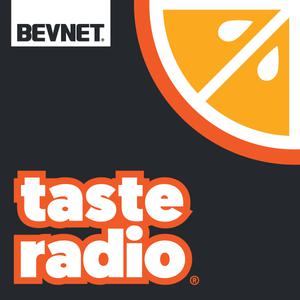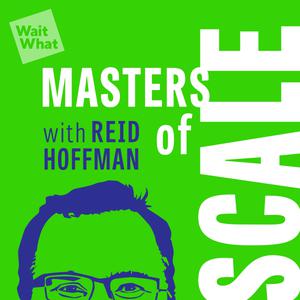
Taste Radio
BevNET Inc.
- 31 minutes 35 secondsTo Live Her Dream, She First Needed To Create ‘Absolute Trust’ In Her Brand
When Amanda Thomson launched Noughty Wines, a pioneering brand of dealcoholized wines, in 2019, she was, in essence, flying blind.
There was no non–alcoholic wine category to speak of, little in the way of market research and certainly no blueprint on how to build the type of company that she envisioned.
But Amanda, a former BBC journalist and broadcaster, did have a gut feeling. There were, she believed, millions of people like her who sought high-quality wines made without alcohol.
It turns out that she was right.
Six years after Noughty’s debut, non-alcoholic wine has emerged as a mainstream concept, and is commonly seen in drink menus at restaurants and bars as well as in grocery and liquor stores across the U.S.
In the following interview, Amanda talks about how she charted an unknown path for non-alcoholic wines, why creating “absolute trust” in the purity of Noughty wine is key to the brand’s resonance with consumers, and why she advises early-stage founders to think about what they want to achieve when crafting their business plans and strategies.
Show notes:
0:32: Interview: Amanda Thomson, Founder & CEO, Noughty Wines – Amanda explains why she never wanted to create a “replica” of traditional wine and talks about how her education and experience in fine wine is pertinent to the development of Noughty. She also talks about why relied on her vision and didn’t research at the historical market for non-alcoholic wine when launching Naughty, why “liquid trumps everything,” how she aligns brand obsession with iterative improvements and why she urges non-alcoholic beverage entrepreneurs to use high-quality ingredients and avoid additives as a way to enhance consumers’ perception of alcohol analogs. Amanda also talks about the impact of media acclaim and why she thinks about her legacy as she builds the brand.
Brands in this episode: Noughty Wines, San Pellegrino, Recess, Trip, BodyArmor, RxBar
21 January 2025, 8:00 pm - 53 minutes 56 seconds$1.5 Billion For BFY Brands. Why They’re Worth It. Plus, ‘Mission’ In A Bottle.
What lessons can we extract from the acquisition of Simple Mills and majority sale of Spindrift, valued at nearly $1.5 billion combined? The hosts talk about what these better-for-you brands did right and what made them attractive to strategic companies and investors.
We also sit down with Marcin Malyszko and Amit Singh, the co-founders of Mission Cocktails, a purpose-driven brand of premium ready-to-serve bottled cocktails.
Show notes:
0:25: Las Diego. Big(ish) Food Was Listening. Neighbor’s Big Pay Day. Hopped Up. Imposters, Deer & Bears. – John and Ray are heading west. Are you as well? Let them know. Nearly a year after Ray’s rant, Simple Mills got its flowers. So did Spindrift, but we still don’t have a vending machine. We’re happy that hop-infused water is finally getting its due (at least from the New York Times), but less pleased with an oddly-named brand of non-alcoholic spirits. John highlights an animal-themed water, and Mike does the same, but for a ginger beer, before Jacqui praises purple snacks.
27:27: Interview: Marcin Malyszko & Amit Singh, Co-Founders, Mission Cocktails – A brand of premium ready-to-serve cocktails that donates 5% of gross revenue to local food banks, Mission Cocktails launched in 2023 and markets several products, including a Manhattan, a Margarita and a Mai Tai, all packaged in 375 mL glass bottles. The brand is sold in over 500 retail stores, including Gelson’s, BevMo, Pavilions and Whole Foods. Marcin and Amit discuss the origins of Mission Cocktails and how their focus on “liquid to lips” and persistent effort to connect with retail executives has helped the brand make significant strides over the past 12 months.
Brands in this episode: Mission Cocktails, Simple Mills, Nature’s Own, Dave’s Killer Bread, Wonder, Canyon Bakehouse, Tastykake, Samuel Adams, Peet’s Coffee, Stirrings, Partake Brewing, Athletic Brewing Co., Lacroix, HopLark, Hop Wtr, Imposter Beverages, Father’s Deer, Liquid Death, Bear & Beaver, Purplesful Snacks
17 January 2025, 1:54 am - 26 minutes 15 secondsThe Human Connection Is A Lost Art. But Monte’s Has Mastered It.
One of PJ Monte’s early sales pitches startled a woman so much that she clutched her purse. A few weeks later, PJ’s tomato sauce was on the shelves of her husband’s influential grocery store.
It’s one of dozens of stories that PJ, a streetwise, fedora-wearing entrepreneur, has about the development of Monte’s Fine Foods, makers of premium, clean label pasta and sauces. Monte’s launched in 2020 and is an homage to PJ’s family, which has a long history in the restaurant and hospitality industries.
A former clothing designer, PJ shifted his focus to food five years ago and began selling jars of homemade sauce out of the trunk of his car. Today, the brand markets a trio of tomato sauces that are produced in small batches and made with carefully sourced ingredients. Monte’s also sells bagged buchi and rolotini dry pasta.
The brand is carried in over 1,000 retail stores across the U.S., including Target, ShopRite, Fairway and Erewhon, and is planning to expand its presence in several other chains later this year.
In the following interview, PJ talks about how his family’s background motivated him to get into the food business, why he credits “human being relationships” for some early wins and the continued growth of Monte’s, how he reduced ingredient costs by 25% without sacrificing quality and how he landed the brand at Target.
Show notes:
0:32: Interview: PJ Monte, Founder & CEO, Monte’s Fine Foods – PJ chronicles his family’s history in restaurants and hotels before recalling a few notable stories about the early days of Monte’s and uncommon methods of distribution. He also talks about how “human connections” between his team and retail buyers are the key to retail relationships and helps differentiate Monte’s from other companies and how a chance meeting helped him secure a major deal for the brand. PJ also discusses his insistence on using premium ingredients and working with a co-manufacturer that could match his standards, how a deep dive into the company’s supply chain helped it secure placement at Target and why he believes that quality doesn’t need to be synonymous with being “the little guy.”
Brands in this episode: Monte’s Fine Foods, Rao’s
14 January 2025, 4:45 pm - 1 hour 54 secondsIs A Warning On Booze Misguided? Plus, The ‘Fatale’ Journey Of An NA Brand.
Is booze so bad that it should come with a warning label? The U.S. Surgeon General thinks so and has advised Congress to act. What, if any, impact would potential legislation have? The hosts discuss.
This episode also features an interview with Julie Cielo, the founder of pioneering non-alcoholic cocktail brand Ferm Fatale, who talks about the successes, missteps and eventual closure of her company.
Show notes:
0:25: Marina Mike. Damp Jacqui. Vegas Craven. Aisle Ray. VIPers. Dunkin’ Pits. Bad Booze. Bull Blood. – Ray thought John was doing Dry January, but it’s another Craven (and Jacqui, sort of) that’s off the sauce. Did we see Mike surf in MDR? You may see John and Ray in Las Vegas and San Diego in a few days. Just as Ray will never sit in a middle seat, Patagonia Provisions never misses. Which of us had dreams of launching a better-for-you soda brand in college? The answer is in our newsletter. Does the world need a Boston cream donut-scented conditioner or orange soda shampoo? Target and Walmart buyers say YES. Are government officials unfairly demonizing alcoholic beverages? What about sugar? Good questions, and we have answe… well, opinions. John mixes up a fresh batch of bull blood-infused beverages before Jacqui gives a ‘fiend a chance and Mike sweats from eating spicy cookies.
32:59: Interview: Julie Cielo, Founder, Ferm Fatale – Launched in 2015, Ferm Fatale was conceived as an “alternative social beverage” designed for health-conscious consumers and marketed as a mixer or a drink that could be served on its own. In the years that followed, the brand’s positioning and packaging evolved to align with growing interest in sober living and rising demand for alcohol analogs. While Ferm Fatale built a significant online business and was carried by natural retailers in Southern California, including Erewhon, the brand faced operational and financial challenges that were difficult to overcome. Last year, Julie made the decision to shut down the company.
Brands in this episode: Magic Cactus, Brez, Patagonia Provisions, Deschutes, Athletic Brewing, Jarritos, Dunkin’, Cafiend, Barbarian Water, Bang, AI Energy, Talkback Shortbread, Ferm Fatale
10 January 2025, 4:00 pm - 11 minutes 48 secondsBo Knows… Beverages? Of Course He Does.
Bo Jackson, the multi-hyphenate sports icon and one of a handful of athletes to play both professional football and baseball, is tackling perhaps his biggest challenge yet – the beverage industry.
Bo is the creator of Bo3.0, a brand of zero-sugar hydration powders formulated with ingredients that are designed to support joint, heart and immunity health. Launched in February 2024, the brand comes in three flavors and is sold direct-to-consumer via the Bo3.0 website and Amazon.
In this episode, Bo and Larry Wert, the CEO of Jackson & Partners, talk about the creation and positioning of Bo3.0, how it fits into Bo’s perspective on nutrition and extends his presence in CPG, and the one reason he wouldn’t want consumers to buy the powders.
Show notes:
0:25: Interview: Bo Jackson, Creator, Bo3.0 & Larry Wert, CEO, Jackson & Partners – BevNET senior reporter Brad Avery speaks with Bo and Larry at BevNET Live Winter 2024, where the former L.A. Raiders running back and Kansas City Royals outfielder talks about travel troubles before discussing the development of Bo3.0 during the Covid-19 pandemic. Bo also highlights his work in the food industry and why he describes his beverage brand as one in which “we do what everyone else failed to do.” He also explains his disdain for those who buy the products solely because of his name, before Larry talks about how Bo3.0 was created to be different from category leading hydration powders. Bo also discusses why they were patient with the launch and why he believes they’re “ready to run,” how he is involved in marketing and promotional initiatives and why he doesn’t watch football or baseball anymore.
Brands in this episode: Bo3.0
7 January 2025, 4:00 pm - 21 minutes 47 secondsWhat’s In Store For 2025? Let’s Run It Back.
What can the past inform us about the future? As we enter a new year, this special edition of the podcast revisits three headlines from 2024 that generated inspired discussion among Taste Radio’s hosts and may hint at things to come for the food and beverage industry.
Show notes:
0:29: PepsiCo Buys Siete – We begin with one of the most celebrated deals of the year, PepsiCo’s $1.2 billion acquisition of modern Mexican-American food brand Siete. In this clip, pulled from an episode published on October 3, the hosts discuss Siete’s rise in the context of emerging food and beverage trends and how investors and strategic companies evaluate better-for-you brands.
6:59: The Launch of Lunchly – Does the world need a new Lunchables? In September, a trio of high-profile influencers – YouTube sensation Mr. Beast, along with PRIME co-founders Logan Paul and KSI – debuted Lunchly, a brand that is similar to Lunchables’ food and format but positioned as a better-for-you alternative. In an episode published on September 20, the hosts weighed in on the new brand and whether it represents significant differentiation from its legacy competitor.
13:52: Pod (Won’t) Save America – A popular Linkedin post about how Big CPG impacts routes to market for small brands was the basis for a conversation featured in an episode published on August 30. The hosts, joined by BevNET’s director of community Melissa Traverse, discussed the scribe – penned by an executive at online distribution platform Pod Foods – and why UNFI and direct competitors may be unfairly cast as villains.
Brands in this episode: Siete, Lunchly, Lunchables, PRIME
3 January 2025, 4:00 pm - 45 minutes 35 secondsHow Today’s Leaders Are Building Tomorrow’s Billion-Dollar Brands
In this special edition of the podcast, we feature highlights from interviews with seven innovators, leaders and disruptors who joined us on the show during the second half of 2024. Our guests include Ben Goodwin and David Lester, the co-founders of Olipop; Poorvi Patodia, the founder and CEO of Biena; Charles Coristine, the CEO of LesserEvil; Peter Rahal, the co-founder of RXBAR & David; Olivia Ferdi, the co-Founder of Trip; and Justin Rosenberg, the founder and CEO of Honeygrow.
Show notes:
0:32: Interview: Ben Goodwin & David Lester, Co-Founders, Olipop – Let’s kick things off with Ben Goodwin and David Lester, the co-founders of leading better-for-you soda brand Olipop, In this clip, pulled from an episode published on August 20, Ben and David talk about why marketing doesn’t lean heavily into the products’ functionality. They also explain why its mission and economic outcome “will forever be entwined” and why hiring talented leaders at the strategic level is “beyond critical.”
11:44: Interview: Poorvi Patodia, Founder & CEO, Biena – Next up we have Poorvia Patodia, the founder and CEO of pioneering chickpea snack brand Biena. In a clip pulled from an episode featured on October 22, Poorvi discusses the “trifecta” of attributes that make for a great brand, how Biena incorporates long-term trends into its innovation strategy and how building to win means learning in small ways.
20:36: Interview: Charles Coristine, CEO, LesserEvil – Let’s keep it going with Charles Coristine, the CEO of fast-growing better-for-you snack brand LesserEvil In this clip, from our episode published on July 30, Charles discusses the value of self-manufacturing for end consumers, why he advocates that founders be “super scrappy” and not over-hire, and his belief that being an entrepreneur is “a hero’s journey.”
25:44: Interview: Peter Rahal, Co-Founder, RXBAR & David – Next we have Peter Rahal, the co-founder of groundbreaking protein bar brands RXBAR and David. In the following clip, pulled from an episode published on October 15, Peter talks about his obsessive work ethic and leadership style, how to create “the best business strategy” and what he means when he says that happiness is “irrelevant.”
31:29: Interview: Olivia Ferdi, Co-Founder, Trip – We continue with Olivia Ferdi, the co-founder of calming beverage platform Trip. In this clip, pulled from an episode aired on November 5, Olivia explains why she never did a market analysis prior to launching Trip and why being obsessed with the details from the outset gave the brand a foundation for rapid scale and success.
35:57: Interview: Justin Rosenberg, Founder & CEO, Honeygrow – Finally, we hear from Justin Rosenberg, the founder and CEO of Honeygrow, the innovative and rapidly growing fast-casual restaurant chain. In the following clip, pulled from an episode published on December 3, Justin talks about Honeygrow’s focus on using “great” ingredients, “the common denominator” among its leadership team, and how consumer feedback influences menu decisions and new product development.
Brands in this episode: Olipop, Biena, LesserEvil, RXBAR, David, Trip, Honeygrow
31 December 2024, 4:00 pm - 27 minutes 53 secondsA Definitive 5 For ‘25. These Things Will Happen. We Hope.
We’re not prognosticators. But we are a hopeful bunch.
With a new year on the horizon, the hosts share five (actually, six) wishes for the food and beverage industry in 2025. Swift progress is unexpected, but these are reasonably achievable goals.
Show notes:
0:25: Upstarts, Assemble! Cann Do. Deal Us In. More NA, Please. Outrageous = 1.7%. – Ray wonders if the team should consider living bi-coastal before encouraging more collaborations between emerging brands. John opines on the huge opportunity for cannabis-based brands and stirs the pot on M&A and nascent categories. Mike calls for material change in the availability of institutional capital, and Ray (once again) hops on his soap box about artificial ingredients. John touts a “perfect” cocktail, while Mike plinks and pops.
Brands in this episode: Fly By Jing, Daily Crunch, Little Sesame, Fishwife, Lundberg, Graza, Aura Bora, Rind, Ghost, C4, French Squirrel, Tanqueray, Guinness, Plink, Happy Pop, Hoste
27 December 2024, 4:00 pm - 34 minutes 58 secondsHow A ‘Small Town’ Is Paving A Probiotic Path To The Big Time
For a brand with a diminutive name, Small Town Cultures has big ambitions.
Based in upstate New York, Small Town Cultures was founded by entrepreneur Cori Deans in 2017. The company uses regional ingredients to make fermented foods that contain no vinegar nor added sugar. Packaged in clear glass jars with minimalist labels designed to showcase the vegetables’ natural color and crispness, Small Town Cultures sells a variety of probiotic-rich products, including its Red Onions, Turmeric Kimchi and Traditional Sauerkraut.
The brand is distributed nationally at a variety of natural, conventional and independent retail chains, including Whole Foods, Price Chopper, Earth Fare and Central Market.
Cori, who created the brand after struggling with a personal illness and later realizing the health benefits of fermented foods, has sought to build Small Town Cultures as a company that can expand the appeal and accessibility of gut-healthy products among consumers across the country.
In this episode, Cori discusses how her passion for probiotics led to the development of Small Town Cultures and how she sought to create a brand that stood out from both legacy and upstart players. She also talks about her response to actress/entrepreneur Jessica Alba’s DM on Instagram, how she manages the complexity of both production and sales and marketing, and how she assesses new retail and distribution opportunities for fermented foods.
Show notes:
0:25: Cori Deans, Founder & CEO, Small Town Cultures – Cori and Taste Radio editor Ray Latif speak amid NOSH Live Winter 2024, where the entrepreneur explains why she “did everything the opposite” when it came to package design and sought to make the use case for Small Town Cultures obvious and accessible. She also talks about how the brand’s logo was inspired by Nike, why she was “waiting for someone else to create a brand for me” before launching her company, and how she began the business in the kitchen of her sister’s restaurant. Cori also discusses the challenge in finding a co-packer that could make products to her standards, the target consumer for Small Town Cultures and why was determined to get the brand carried by conventional grocery chain Price Chopper. She also explains why she wishes that she had a co-founder, how she talks about the company to new and prospective hires, working with angel investor firm Point Positive and why she’s excited about every day.
Brands in this episode: Small Town Cultures, Once Upon A Farm
24 December 2024, 4:00 pm - 1 hour 1 minuteWere We All Wrong About Olipop & Poppi?
We also speak with Steffin Oghene and Tony Salles, the vice president and third-generation master distiller, respectively, of awarded tequila brand El Tequileño along with Davide Segat, the bars manager at the city’s NoMad Hotel, for a conversation about the creation of a limited-edition tequila, the Side Hustle Select Barrel Double Añejo.
Show notes:
0:25: So Dark. Timing & Negotiations. Best Of. Tokyo Twinkies. AM Greek Cocktails. – Ray is a hot mess, but it’s fine because Donnie Darko and Denis Villeneuve films have entered the chat. John describes Coke and Pepsi’s BFY soda plans as “a story we’ve seen before” and compares the prebiotic pop category to the early days of energy drinks in the U.S. Mike draws an analogy between tech and beverages, Jacqui wonders about the timing of Coke and Pepsi’s plans and Ray notes the former’s strategy of focusing on its legacy brands as opposed to buying new ones. The hosts also encourage listeners to revisit content from BevNET and NOSH’s winter events before wolfing down on the latest viral food sensation and waxing on what makes Gen Z consumers excited about certain snacks and beverages. Mike gets amped about Maazah and Jacqui recalls slugging boozy Greek libations early in the morning.
34:02: Interview: Davide Segat, Side Hustle & Steffin Oghene/Tony Salles, El Tequileño – Davide, Steffin and Tony Salles discuss the rise in tequila consumption and popularity in the U.K. and U.S., the origins of the Side Hustle Select Barrel Double Añejo and how much planning and experimentation went into the final product, and how limited-time offerings fit into the marketing strategies for both Side Hustle and El Tequileño.
Brands in this episode: El Tequileño, Simply, Soulboost, Olipop, Poppi, Culture Pop, Sobe, Coca-Cola, Pepsi, Vitaminwater, Powerade, BodyArmor, Bubly, Red Bull, Monster Energy, Rockstar Energy, KMX, Mountain Dew, Fresca, Hurray’s Girl Beer, Beer Girl, Basic Cellars, Superfoodio, Tokyo Banana, Maazah, Fly By Jing, Gloria’s Shito, Kleos, RMBR
20 December 2024, 4:00 pm - 33 minutes 21 secondsNo Joke, This Comedian’s ‘Basic’ Brand Gives Modern Consumers What They Want
Being “basic” has long been a theme of Trey Kennedy’s popular standup routine and sketch comedy. He recently introduced the perfect pairing for his humor, Basic Cellars.
An Instagram sensation with over three million followers, Trey debuted Basic Cellars in October. Created in partnership with premium wine producer In Good Taste, the brand is designed to appeal to modern consumers who love wine, but are often put off by complicated and confusing verbiage. Basic Cellars sells two wines, a California Pinot Noir and an Italian white, that come in single-serve 187 mL glass bottles.
Marketed as “wine for people who don’t take themselves too seriously,” Basic Cellars is sold online in eight-packs for $60. The brand is gradually making its way into brick-and-mortar stores, according to Trey, who recently joined us for an interview.
As part of our conversation, Trey talks about how Basic Cellars melds his passion for comedy and wine, how the brand presents itself as a both an accessible and premium option, how its core audience aligns with that of his own and how he attempts to authentically incorporate the brand into his social media content.
Show notes:
0:25: Trey Kennedy, Founder, Basic Cellars – Trey chats with Taste Radio editor Ray Latif about how he embraced wine after he “graduated” from beer and why the beverage is popular with his fanbase. He also talks about the reason for Basic Cellars’ bottle size, whether featuring the brand in his social posts has generated significant sales and how he attempts to create content that doesn’t feel like an ad. Trey also discusses his process for promoting other companies, whether Basic Cellars will begin to sell merchandise, the potential to extend the brand into other beverage categories and how he incorporates consumer feedback into business planning. He also talks about the company’s retail strategy and potential collaborations and shares his take on the most effective social media platforms.
Brands in this episode: Basic Cellars, Loverboy
17 December 2024, 5:35 pm - More Episodes? Get the App
Your feedback is valuable to us. Should you encounter any bugs, glitches, lack of functionality or other problems, please email us on [email protected] or join Moon.FM Telegram Group where you can talk directly to the dev team who are happy to answer any queries.
 Masters of Scale
Masters of Scale
 Wisdom From The Top with Guy Raz
Wisdom From The Top with Guy Raz
 All the Hacks with Chris Hutchins
All the Hacks with Chris Hutchins
 Limited Supply
Limited Supply
 The Tim Ferriss Show
The Tim Ferriss Show